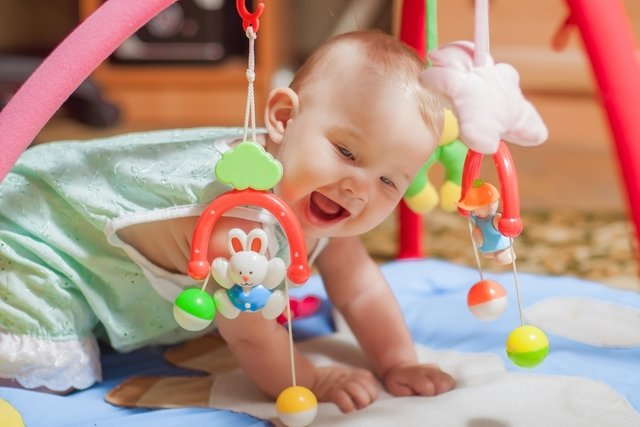It is normal for babies to take a long time to sleep in the first few months of life or not sleep all night, as they may wake up every 2 or 3 hours to feed or feel uncomfortable and unprotected, which can be exhausting for parents, who they are used to resting at night.
Therefore, it is important to create a welcoming environment for the baby, with adequate lighting and temperature, leave the baby in a comfortable position, wear clothes that do not constrict him and create a bedtime routine.
The number of hours that a baby should sleep depends on their age and level of development, but it is recommended that the newborn sleep between 16 and 20 hours a day, distributed over periods of a few hours throughout the day. However, as the baby grows, it is possible for the baby to sleep all night and alone. Understand when your baby can sleep alone.
Watch the video with quick, simple and infallible tips for your baby to sleep better throughout the night:
What to do at bedtime
Some tips to do before bedtime that help your baby feel more relaxed and safe to sleep through the night are:
1. Reproduce the womb environment
For babies aged 1 to 3 months, reproducing the environment they had when they were in the womb can be a great help to sleep longer and better. This is because at this stage, the baby is not yet aware that it is not inside the uterus and, therefore, placing the baby next to the mother’s or father’s body, or picking the baby up and rocking it, making gentle rocking movements. , help the baby to feel as if he were still inside the belly, making him sleep calm and peaceful.
2. Wrap the baby
From birth until the age of 4 or 5 months, babies have a startle reflex that can happen during sleep, in which they feel as if they are falling, and this sensation of falling can cause the baby to wake up sometimes during sleep.
A good way to ensure that the baby feels safe is to keep him in the position in which he was in the belly, curled up. To do this, you must wrap the baby in a blanket or diaper, but without pressing it, and avoid putting on clothes that leave the baby too stretched or that hinder their movements. This prevents the baby from having a startle reflex and waking up scared.
3. Play white noise
White noise is a consistent and soft sound that drowns out any other sound that could disturb your baby’s sleep, such as noises around the house or noises coming from outside, such as conversations, cars on the street or dogs barking, for example.
This type of noise is especially important for calming the baby as it recreates the same type of sound that the baby heard when it was in its mother’s tummy, which makes the baby calmer and safer, allowing for a more peaceful and lasting sleep. Additionally, a very quiet environment can scare the baby, activating the cerebral cortex, which can make the baby wake up scared at night.
To create white noise, you can use a fan, as long as the wind is not directed towards the baby, buy electronic white noise devices or use apps on your cell phone.

4. Create a comfortable bedroom environment
Keeping the room at a comfortable temperature, neither too hot nor cold, and with adequate lighting, keeping the room darker and turning off bright lights throughout the house, can help your baby sleep better throughout the night.
Another important tip is to close the window to avoid external noise and the curtains to reduce the light coming from the street. However, you can leave an indirect night light, such as a plug lamp, so that the child, if he wakes up, is not scared by the dark.
5. Lay the baby in the crib
The baby should sleep in the crib from birth, to get used to his bed and be able to sleep more easily, in an environment that he learns to recognize as a safe place. Therefore, parents should place the baby in the crib while still awake to recognize that it is time to sleep, facilitating peaceful sleep throughout the night.
Furthermore, the crib is the most comfortable and safe place for the baby to sleep, as sleeping in the playpen or car seat is uncomfortable and causes body pain, and in the parents’ bed it can become dangerous, because the parents can hurt the baby during sleep.
6. Breastfeed before bed
Another way to help the baby fall asleep faster and stay asleep for longer is to put the baby to breastfeed before bed, as this leaves the baby feeling full and has more time until they feel hungry again.
However, as the baby grows, night weaning should be encouraged, so that the baby sleeps longer at night. Find out how and when to wean.

7. Wear comfortable pajamas
When putting your baby to sleep, even if it’s just to take a nap, you should always wear comfortable pajamas so that your baby learns what clothes to wear when it’s time to go to bed.
To ensure that the pajamas are comfortable, it is important to choose cotton clothes, without buttons or threads and without elastics, so as not to hurt or squeeze the child.
8. Offer a teddy bear to sleep
Some babies like to sleep with a toy to feel safer and, generally, there is no problem for a child to sleep with a small stuffed animal.
However, you should choose toys that are not too small because there is a chance that the baby will put them in their mouth and swallow them, as well as very large dolls that could suffocate the child.
However, according to the Brazilian Society of Pediatrics, stuffed animals, crib bumpers or crib bumpers should not be used by babies in the first year of life, due to the risk of suffocation.
Furthermore, children with respiratory problems, such as allergies, asthma or bronchitis, should not sleep with stuffed dolls, as they can accumulate dust and make the respiratory disease worse.
9. Get a massage
Some babies become drowsy after a back and leg massage, so this can be a way to help the baby fall asleep faster and for longer, and is also an excellent option for creating a baby’s sleep routine. See how to give your baby a relaxing massage.
10. Changing the diaper before bed
When parents put their baby to sleep, they should change the diaper, cleaning and washing the genital region so that the child always feels clean, dry and comfortable, as a dirty diaper can cause discomfort and make the baby uncomfortable and disrupt sleep, in addition to may cause skin irritation.

What to do throughout the day
Some tips to do throughout the day can help stimulate your baby’s sleep at night and make him sleep through the night, and include:
1. Limit the duration of naps
Naps during the day are very important for the baby’s development and the number of hours varies from one baby to another. However, one of the ways to get your baby to sleep through the night is to limit the duration of naps during the day.
Still, it is important for the mother or father to observe whether the baby needs longer naps, so the nap time should be increased.
2. Stimulate the baby during the day
Stimulating the baby during the day, taking advantage of the time he is awake, from the first months, can help the baby sleep better as the interaction and stimuli cause tiredness and deeper sleep. See how to stimulate your baby between 0 and 12 months.
However, care must be taken not to tire the baby too much, as in this case, there is an increase in cortisol, the stress hormone, which can make the baby very agitated, with signs such as scratching the eyes or grabbing and pulling at the hands. ears, which means the baby will take longer to sleep.

3. Identify sleep signs
Knowing how to identify signs of sleep in your baby is important to understand the best time to put your baby down for a nap or to sleep.
Generally, the signs that the baby is sleepy are: looking more distant and still or becoming slower. It is at this moment that you should pick up the baby, rock it, take it to the room, create a comfortable environment and turn on the white noise, to allow the baby to sleep calmly and peacefully throughout the night.
4. Create a bedtime routine
Some studies show that creating a routine is essential to signal to the baby that it is time to sleep, leaving him more relaxed.
This routine should be easy and simple to do every night and for everyone in the house.
Some ways to create a bedtime routine are:
- Have a relaxing massage;
- Take a bath before bed;
- Breastfeed in dim light;
- Reduce the light in the room;
- Turn on white noise;
- Sing a lullaby;
- Tell a little story.
A bedtime routine can help create positive sleep associations for your baby, helping them sleep at the right time in a peaceful, relaxed way throughout the night.

Sign up for our newsletter and stay up to date with exclusive news
that can transform your routine!
Warning: Undefined array key "title" in /home/storelat/public_html/wp-content/plugins/link-whisper-premium/templates/frontend/related-posts.php on line 12
Warning: Undefined array key "title_tag" in /home/storelat/public_html/wp-content/plugins/link-whisper-premium/templates/frontend/related-posts.php on line 13



